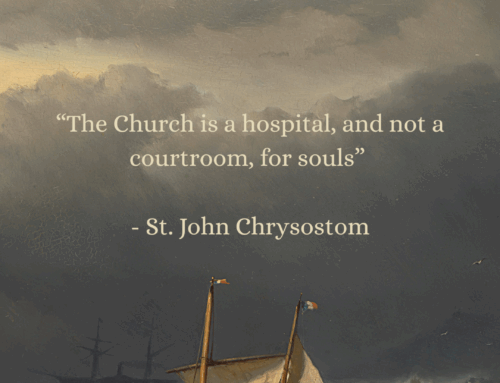“The most important thing in prayer is that we present ourselves as we are before God as He is” – Thomas Merton
At its core, Lent is about preparing ourselves for a deeper and fuller reception of Christ into our hearts. The Church encourages the practice of prayer, fasting, and almsgiving as the primary methods of preparation. Ultimately, this culminates in the celebration of Holy Week, coming to fruition on Easter Sunday, when we receive and celebrate the Risen Lord. In many ways, this journey can be summed up as a movement from death to resurrection; by laying down our self-reliance (“dying to ourselves”) and making room for our dependence on God, we can be transformed. Dropping down and making contact with our hunger for God is the first step towards a deeper connection with Him. This requires us to lower our defenses and acknowledge our vulnerability, often laying aside the things we use to shore ourselves up. This is the place where mental health enters the picture; it can be incredibly painful (and dangerous) to suddenly abandon coping strategies that are keeping us afloat. My hope is that this article can provide some guidance on how to participate in Lent while also making mental health a priority. If we are to give ourselves to God completely as we are, we must make room for our mental and emotional state.
The first thing to consider is the responsibility we have to adequately care for our mental health. A good question to ask might be, “What do I need to care for my mental and emotional wellbeing, and am I doing that now?”. Finding some clarity around these needs can help us discern the non-negotiable areas of what to sacrifice for Lent. It would not be safe to adopt any practices that significantly compromise our mental and emotional stability. Yes, it is true that fasting/abstaining and increased spiritual discipline can be distressing but it shouldn’t be so distressing that we can’t function or are in danger of a mental health crisis. In other words, if our attempts to clear space within ourselves lead to more significant mental health symptoms, it defeats the purpose of Lent because most likely, we won’t be able to receive anything. We must keep in mind that the purpose of spiritual discipline is to be more fully united with God, not to make ourselves miserable. In fact, doing the hard work of choosing healthy coping options, attending therapy, and engaging our pain and suffering is enough of a sacrifice in and of itself. With this in mind, fasting could take the form of fasting from unhealthy ways of addressing your mental health.
Once you’ve carved out what you need to be able to care for your mental health, you can begin to discern what sacrifices make sense in light of your needs. The goal is to start small and find your window of tolerance; identify a sacrifice that can be consistently sustained throughout the Lenten season. You can always add on as you go but it would most likely be more beneficial to really put your heart into the sacrifice you have chosen. Some of the desert fathers are famous for how they addressed this, saying it is better to break a fast or eat with a friend who is visiting than to be overly rigid and fall into sin as a result. Similarly, they stress the importance of engaging our hearts through prayer; one word said wholeheartedly can be more transformative than an hour-long prayer session without fully engaging the deepest parts of ourselves. I’m reminded of the words of Macarius the Great, “There is no need at all to make long discourses; it is enough to stretch out one’s hands and say, “Lord, as you will, and as you know, have mercy”. And if the conflict grows fiercer say, “Lord, help!”. He knows very well what we need, and He shows us His mercy”. We hear this from Christ Himself in the Gospel of Matthew: “Take my yoke upon yourselves and learn from me; I am gentle and humble of heart, and you shall find rest for your souls” (Matthew 11:29).
It’s possible that in your efforts to discern what you can do, thoughts or feelings related to what you can’t do will emerge. This makes sense given our very human struggle to feel “enough”. Many of us have been through very painful experiences, leaving us protective of these deeper hurts and wounds. Of course, this is understandable; the human heart can only endure so much before it closes up to protect itself from further pain. This is the very place that God longs to enter with us; He has conquered death itself and therefore can reign over the brokenness in our hearts as well. In our efforts to open ourselves up through fasting, prayer, and almsgiving, let us remember to invite His loving presence into these raw spots and pockets of pain. He has already declared us “enough” through His death on a cross. Can you linger with these words and take them in, even if just a drip?
“Through spiritual surgery, the Holy Spirit moves into the cracks and crevices of our hearts to remove any lingering or useless words and/or acts of rejection. His love is enduring and powerful enough to bring complete healing for a renewed, vibrant life in Christ. The scars and memories remain; however, their potency for pain is significantly reduced to ashes when God heals” – Crystal McDowell, Orthodox Christian writer
Considering this article will be published about halfway through Lent, I think it’s important to address what to do if you’ve already made a Lenten commitment. First off, there’s no “right way” to balance Lenten commitments and mental health. Our mental health needs can vary significantly and so can our place on the spiritual path. That being said, if things are feeling stuck, overwhelming, and fruitless, then it makes perfect sense to reset and try something different for the last three weeks of Lent. Feel free to take what is most relevant to your journey and discard the rest. You might want to start with a question: “What will help me open my heart to the mystery of Holy Week and help me receive Christ more fully into my heart?”. You may be surprised by the answer. You may need more mercy, compassion, and validation to be able to have the courage to go deeper into your heart and let Christ meet you there. We are so tough on ourselves sometimes and feeling the relief of acknowledging our very good reasons for struggling can be like a healing salve that emboldens us to take the next few steps closer to God. Perhaps we all need some validation for what we’ve endured, both our individual stories and as a collective. After all, we’re at the one-year anniversary for when the pandemic started, and it feels like Lent never ended last year with all that we’ve had to sacrifice. What a testimony to the strength of the human spirit! It’s ok to rest your head for a moment and take a deep breath, Christ is always there to hold our tired souls.
– Jonathan Dixon, LMFT
Jonathan Dixon is a Licensed Marriage and Family Therapist in Virginia who has offered mental health services at Alpha Omega Clinic’s Fairfax office since 2013. He is an active member of the Association of Marriage & Family Therapy. He also seeks to inspire healing and wholeness through reflections on Instagram @deepspeakstodeep.




